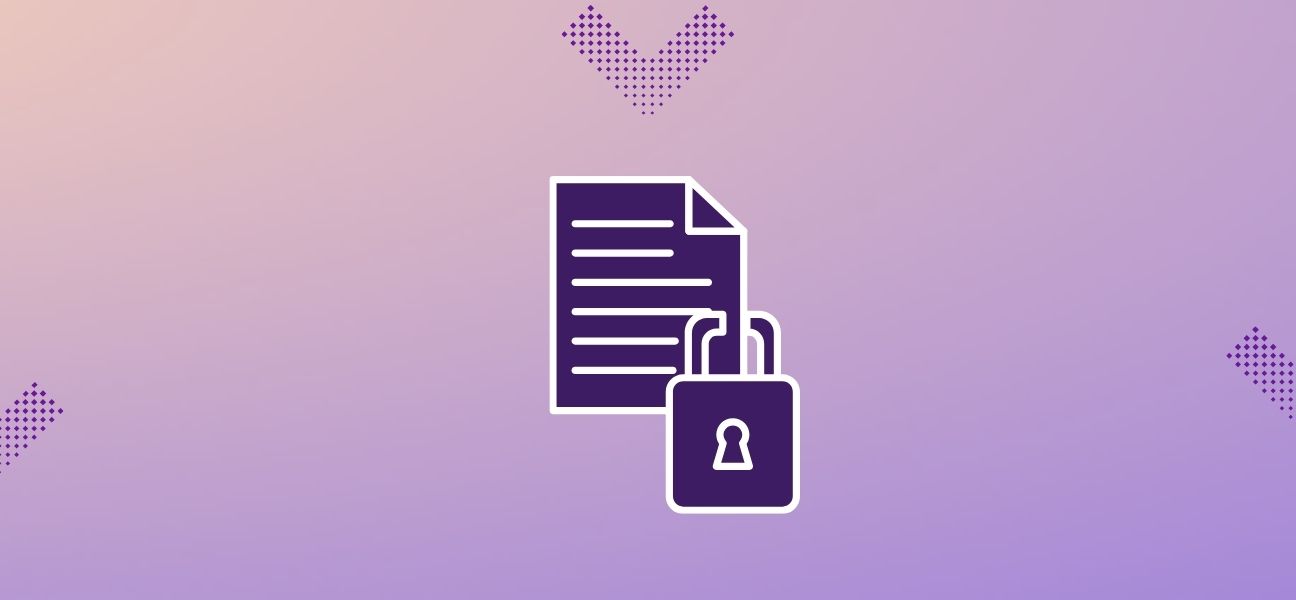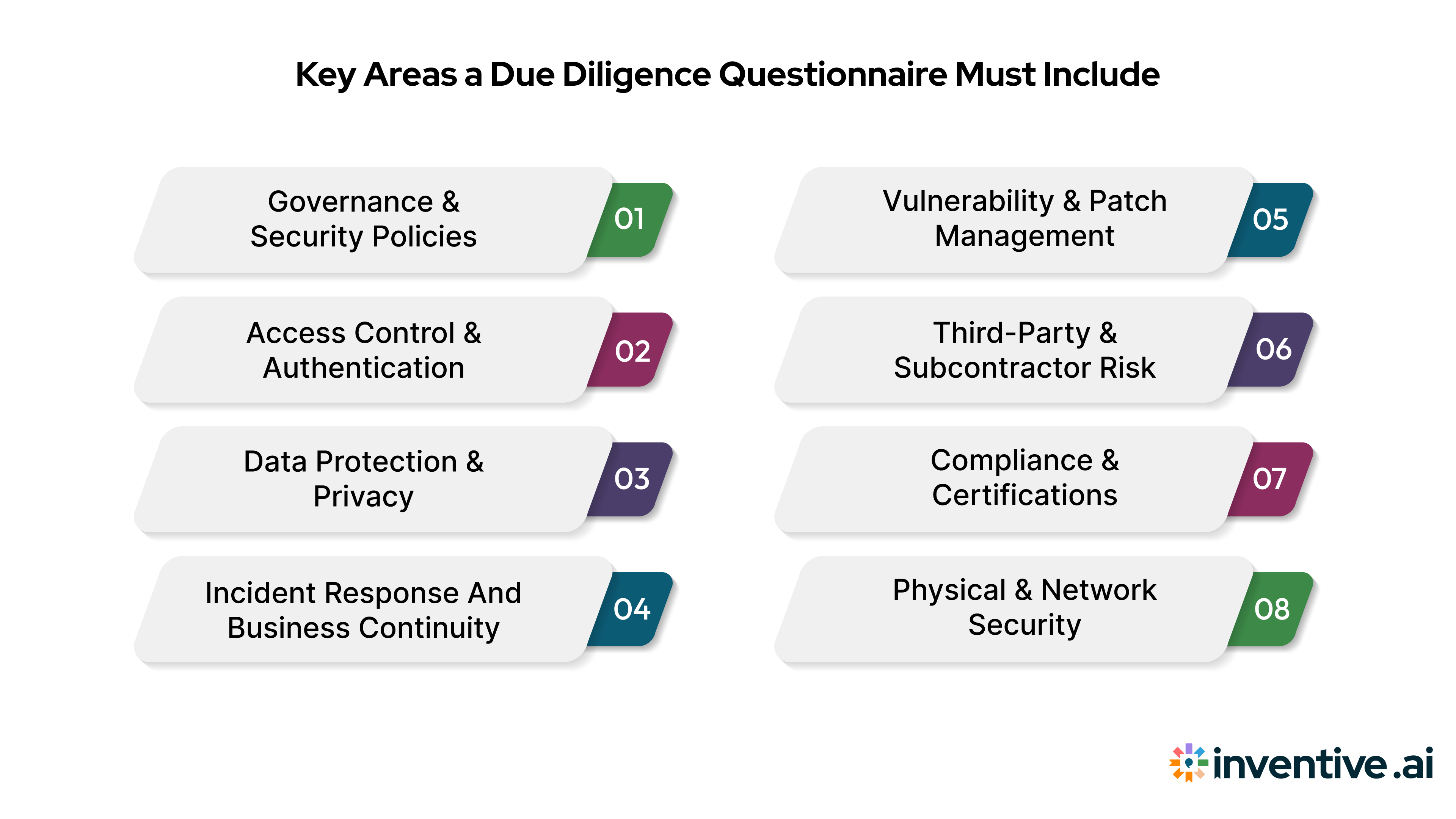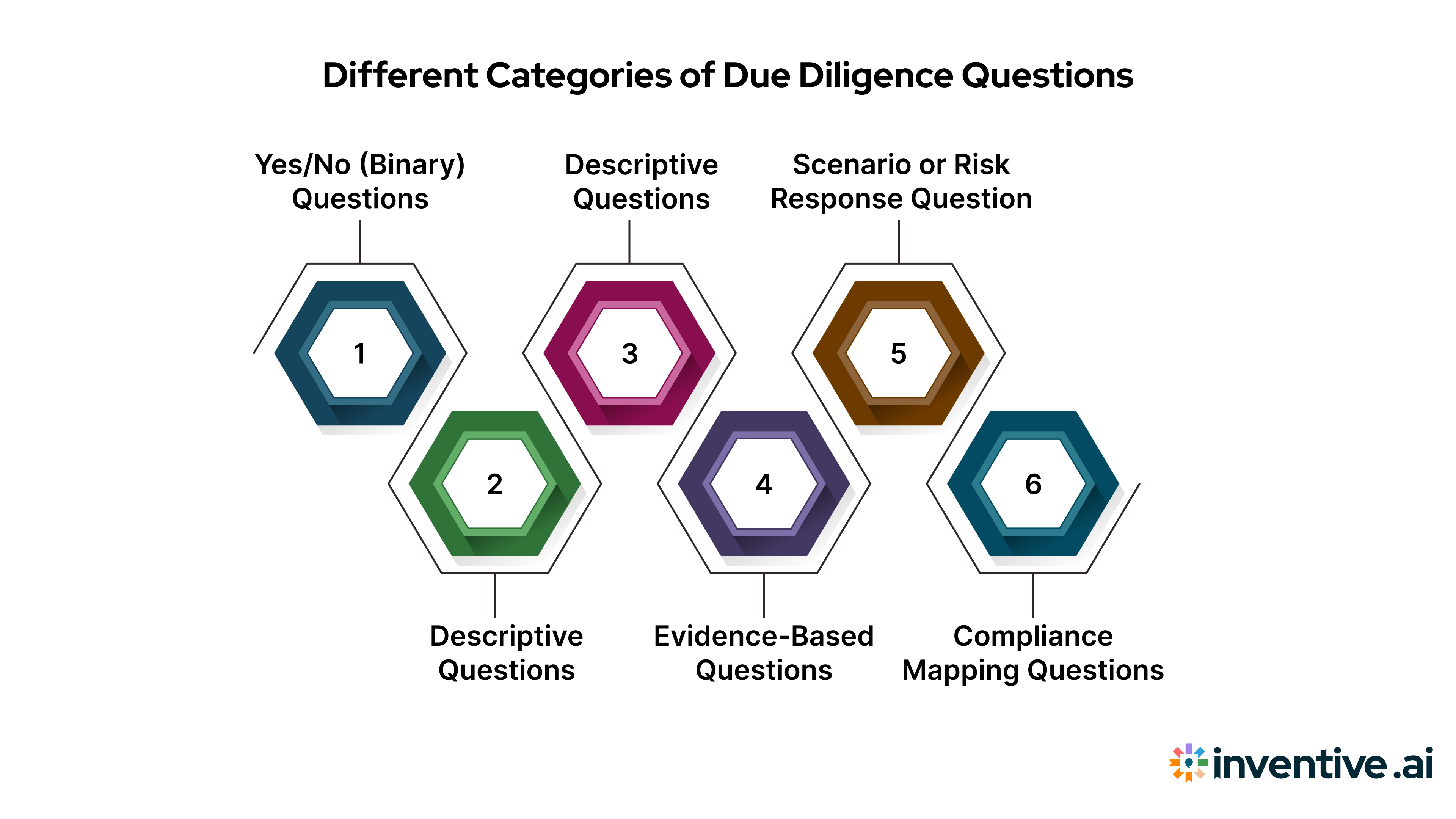Understanding the Importance of Information Security Due Diligence Questionnaire
In this blog, we will explain what an information security due diligence questionnaire is, what it includes, why it matters for vendors and sales teams, and how responding effectively can strengthen trust and accelerate deal approvals.

Introduction
Research shows that about 84% of organizations are strengthening their due diligence process to reduce risks related to cybersecurity. Before any contract is signed or data is shared, organizations use structured questionnaires to assess how well a vendor protects sensitive information. As per research, the global average cost is 4.4M.
Information security due diligence questionnaire ensures that vendors follow best practices and comply with standards such as ISO 27001, SOC 2, and GDPR.
For vendors, completing these questionnaires is often time-consuming and complex, requiring input from multiple teams and precise documentation. Yet, doing it right builds trust, reduces risk, and can directly influence deal success.
In this blog, we will explain what an information security due diligence questionnaire is, what it includes, why it matters for vendors and sales teams, and how responding effectively can strengthen trust and accelerate deal approvals.
Key Takeaways
- An information security due diligence questionnaire is a crucial step in building buyer trust and validating a vendor’s security readiness.
- It helps organizations assess governance, data protection, access control, and compliance with global standards like SOC 2, ISO 27001, and GDPR.
- For vendors, completing these questionnaires accurately can accelerate deal approvals and strengthen long-term business relationships.
- Common mistakes, such as outdated answers or missing evidence, can slow down reviews and raise red flags in vendor evaluations.
- Automation tools, such as AI-powered RFP response software, streamline the process, ensuring faster, more consistent, and audit-ready submissions.
What is an Information Security Due Diligence Questionnaire?
An information security due diligence questionnaire is a structured document used by organizations to evaluate the security posture of potential or existing vendors. It helps buyers verify that a vendor follows proper data protection, access control, and incident management practices before granting access to sensitive systems or information.
These questionnaires are usually part of the vendor risk assessment process conducted during RFI or RFP stages, mergers and acquisitions, or periodic compliance reviews. By completing them accurately, vendors demonstrate transparency, build buyer confidence, and reduce the risk of delays during deal evaluation.
Knowing the information security due diligence questionnaire is only half the story. Vendors can write more accurate, complete, and legal responses if they know what it covers.
Must Read: How to Automate Due Diligence Questionnaires (DDQs): Your Complete 2025 Guide
Things a Due Diligence Questionnaire Should Cover
An effective information security due diligence questionnaire is designed to give buyers a complete view of how securely a vendor manages data and technology systems.

Here are the core areas it typically covers:
1. Governance and Security Policies
Evaluates whether the organization has formal, regularly reviewed policies for information security, data protection, and access management.
2. Access Control and Authentication
Checks how access is granted, tracked, and revoked for users, including password policies, multi-factor authentication, and privileged account management.
3. Data Protection and Privacy
Reviews how sensitive or customer data is stored, transmitted, and encrypted, and whether privacy laws such as GDPR or CCPA are followed.
4. Incident Response and Business Continuity
Assesses the vendor’s ability to detect, report, and respond to security incidents, as well as maintain operations during disruptions or cyberattacks.
5. Vulnerability and Patch Management
Ensures systems are regularly updated, vulnerabilities are tracked, and security patches are applied promptly.
6. Third-Party and Subcontractor Risk
Examines how vendors manage and monitor their own suppliers or partners that may have access to shared systems or data.
7. Compliance and Certifications
Requests evidence of recognized standards and certifications like ISO 27001, SOC 2, or PCI DSS to confirm independent validation of controls.
8. Physical and Network Security
Look at how physical data centers, office networks, and devices are secured against unauthorized access or tampering.
Companies can get an accurate picture of a vendor's security level by looking at these areas, not just what's written in their policy documents.
Now that you know the main areas, you need to understand the kinds of questions you'll be asked and how each shows a different level of security maturity.
Must Read: Comprehensive RFP Checklist for Winning Proposals
Types of Due Diligence Questions

An information security due diligence questionnaire includes a range of questions to assess both the existence and the effectiveness of a vendor’s security practices.
Each question type is meant to reveal a different aspect of a vendor's maturity, from simple yes/no answers to in-depth process explanations.
Here are the most common types:
1. Yes/No (Binary) Questions
These direct questions verify whether essential security controls are implemented. They offer quick clarity on baseline practices such as encryption or access management.
Example: “Do you encrypt customer data at rest and in transit?”
2. Descriptive Questions
These require short explanations about how a control or process is executed. They help assess whether your organization’s security measures are practical and well-defined.
Example: “Describe your company’s process for monitoring security incidents.”
3. Evidence-Based Questions
These requests verifiable proof such as policies, certificates, or test reports. They validate your claims and reassure buyers that controls exist and are regularly audited.
Example: “Provide a copy of your most recent SOC 2 report or ISO 27001 certification.”
4. Scale or Maturity-Based Questions
These questions assess how advanced your security processes are, often rated on a scale from 1 to 5. They help buyers gauge your organization’s operational maturity and automation level.
Example: “Rate your patch management maturity on a scale of 1–5, where 5 means fully automated.”
5. Scenario or Risk Response Question
These test your readiness to handle real-world security incidents. They measure how quickly and effectively your teams can respond to potential threats or breaches.
Example: “If a vendor system is breached, what steps would you take within the first 24 hours?”
6. Compliance Mapping Questions
These connect your security controls with established frameworks and standards. They show how your organization aligns with global benchmarks like NIST, SOC 2, or ISO 27001.
Example: “Which controls align with NIST or SOC 2 criteria for access management?”
To make this more concrete, here are real-world examples of the kinds of questions vendors typically receive and how they’re categorized.
Examples of Information Security Due Diligence Questionnaire
An information security due diligence questionnaire helps organizations assess a vendor's data security, breach prevention, and industry compliance.
These questionnaires help vendors convince buyers of their reliability, security, and compliance, which affects whether a deal goes forward.
Below are detailed examples of questions typically included, grouped by category:
Answering these questions accurately affects how quickly deals move forward and how buyers view your credibility, not just a checklist.
How is the Due Diligence Questionnaire Helpful for Vendors and Sales Teams?
Information security due diligence questionnaires build trust and can boost vendor revenue, especially in SaaS, finance, and technology. Good answers demonstrate accountability, transparency, and operational maturity, which buyers consider before signing.

Here’s how it helps vendors and sales teams:
1. Builds Buyer Confidence and Speeds Up Approvals
Completing due diligence questionnaires thoroughly reassures potential clients that your organization follows strong data protection and security practices. This shortens the buyer’s risk review phase, helping deals close faster.
2. Positions You as a Trusted, Enterprise-Ready Vendor
Consistent, well-documented responses demonstrate that your company is proactive in risk management and compliance. This can differentiate you from competitors who appear less prepared or slower to respond.
3. Reduces Rework Across Sales Cycles
A centralized, ready-to-use knowledge base of approved security responses saves time and prevents teams from rewriting similar answers for every RFP or questionnaire. This efficiency frees sales and proposal teams to focus on strategy rather than repetitive tasks.
4. Improves Cross-Team Collaboration
Security questionnaires require input from IT, Legal, Compliance, and Sales teams. Treating the process as a collaborative workflow ensures consistent messaging and minimizes errors, resulting in more accurate submissions.
5. Avoids Delays Caused by Incomplete or Inaccurate Answers
Incomplete security responses often trigger follow-ups, extending review timelines. A strong due diligence process minimizes such delays, keeping the deal momentum intact.
6. Strengthens Your Brand’s Security Reputation
Over time, well-managed responses reflect a company that takes data protection seriously. This reputation helps during renewals, audits, and enterprise-level negotiations.
For most vendors, responding to information security due diligence questionnaires feels like a bottleneck because of repetitive, time-consuming, and scattered across multiple systems.

90% Faster RFPs. 50% More Wins. Watch a 2-Minute Demo.
Recognizing that complex RFPs demand deep technical context rather than just simple keyword matching, Vishakh co-founded Inventive AI to build a smarter, safer "RFP brain." A published author and researcher in deep learning from Stanford, he applies rigorous engineering standards to ensure that every automated response is not only instant but factually accurate and secure.
Tired of watching deal cycles stall due to manual questionnaire back-and-forth, Dhiren co-founded Inventive AI to turn the RFP process from a bottleneck into a revenue accelerator. With a track record of scaling enterprise startups to successful acquisition, he combines strategic sales experience with AI innovation to help revenue teams close deals 10x faster.



